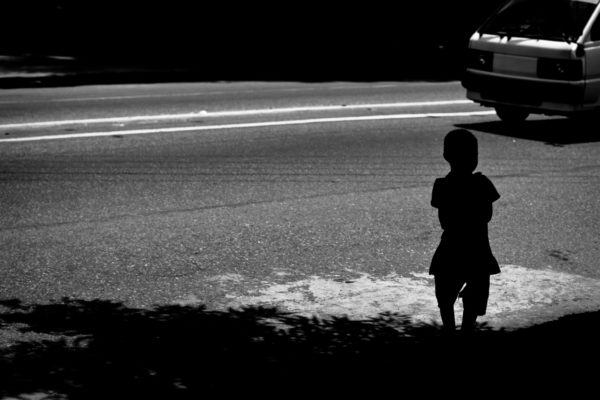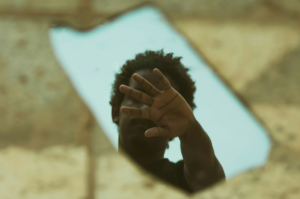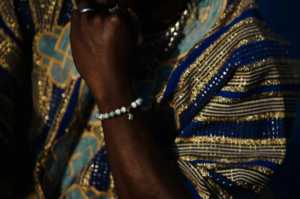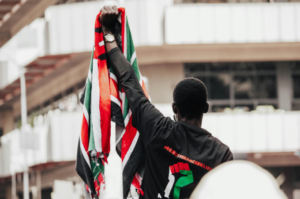
“He was running through the fields like the breath of God, screaming and hollering and raising his hands to the sky.”
On the twenty-fifth day of July, sometime around two a.m., in my dreamscapes, I came across a little boy on a grass field. I remember that field well; it was where I learned that the beautiful game of football belied a savage nature I was both physically and mentally unfit to tackle, and now that I think about it, many beautiful people are like football. They kick and scream and dribble and tackle you and you’re left disoriented and slightly flustered with a torn shirt and a broken sole. The boy wore a white shirt and blue jeans, like I did, and he was sitting on the grass with a ball between his legs. And I said, What are you doing here? And he said, I’m waiting for you, Tomi. And he raised his face to me and I saw that it was my face, and that he had my eyes and the same gap in his front teeth, and as he smiled I said, Are you me? And he said, Well, then, I see I’m still stupid. So I said, You haven’t seen the half of it.
Let’s play monkey post, he said. The field is wide enough for us both and we have a lot to catch up on. I agreed, and as I took off my shoes and rolled the legs of my jeans up I saw that his stare was also mine, more mine than it was mine, having been unchanged by time and experience, an intense bore that had on occasion made people uncomfortable, and while he tracked my every movement I asked, How old are you? And instinctively I knew he was twelve. He said, Twelve. I’m in JSS3 too, you know. Great, I said, JSS3.
It was a time of great uncertainty for me. My only friend, having repeatedly insisted on being haunted by demons, had hung himself, but not before he blamed me for having colluded with the demons. After he died I had spent the next months in hiding and constant fear. And Tomi said, Yeah, things have been rough. I don’t want to talk about it. And I said, We mostly got through it, although in my dreams I still see him as I always imagined him to have died, slowly oscillating dreamlike through the stillness, eyes wide open. I don’t want to talk about it, Tomi said. Are we going to play football or what?
So we played football, running through the field and uprooting grass with missed kicks and weird tackles. The sun was hot and the wind was oddly stilled and soon I began to sweat and he said, You’re out of shape. You’re like Moses–old. I said, You like Mr. Biggs and cake and Coke and Fanta, right? He said, Yes. And I said, You’ll get here soon enough, and I’ll tell you what, you’ll even lose some teeth to all that sugar. Yes, at least one tooth will rot inside your mouth, and you’ll have to get fillings and the dentist will drill and pour iron into the holes in your teeth. He stopped, his eyes wide as the horizon, and said, Which teeth? The back ones, I said, the molars, and your mouth would smell and girls would refuse to kiss you. Have you ever been kissed before, he asked, and in his voice there was nothing but quiet earnestness. The ball lay abandoned beyond the region we marked out as our field, and the multicoloured patterns on its white leather weakly glimmered in the sun. I smiled and said, I’ve had three girlfriends. And he came closer to me as one would a precious revered object, and in his eyes I saw adulation and envy, and slowly he raised his left hand and I watched him form a circle with his thumb and index finger, and then he raised his right index finger and repeatedly thrust it in and out of the circle he had made. Did you, he began, and I saw he could say no more. I nodded my head and said, Yes. How was it, he asked, having stopped the gesture completely. He looked at me as I imagined Mary looked at the Angel Gabriel during the Annunciation of Our Lord. You’d be surprised how tiring it is. And he gave a celebratory shout, the like of which I have scarce heard, and he was running through the fields like the breath of God, screaming and hollering and raising his hands to the sky, and I thought, Nerd. And finally he came to me and said, Give me five. And with a head bowed in shame I extended my right palm weakly, and the force of his slap threw me off slightly.
By now the game of football, at which we both had been terrible, had been completely forgotten. Are you a rapper now, he said. No, I am an environmental engineer, writer, and all-around creative. Creative, he said. What does that mean. I tell stories using certain media: prose, photography, lyrics, graphic design. Wow, he said, and the syllable went on for fifteen seconds, during which he never took his eyes off me. Are you rich? No, I said, but I’m working on it. In due time, Tomi, in due time. Do you have a phone, he said. I have an iPhone. What is an iPhone? It is a touchscreen phone that has a camera, a music player, a map, and you can actually watch movies on them. No way—when he said this, his eyes were so wide I feared for the seat of his pants—like a computer? It’s even better than the computer you have, I said. It’s connected to the Internet all the time. Now you’re lying. No, seriously, I said, take a look. I reached into my pockets and showed him the device and when he began to fiddle with it he became so engrossed in his playing that I grew bored and lay down on the grass, looking upwards and counting the birds that crisscrossed the sky, migrating east, west, north, south, flocks of geese and lapwings and pigeons and sparrows and swifts with their throbbing hearts and wings beating in blurred constant motions, and I remembered that once, when I was he, I had read the story of Daedalus and Icarus and had become fascinated by the mechanics of flying, so much so that I had in my room the most curious of collections: newspaper clippings of airplanes, poor drawings of bird wings, and taped to my wall there had been pictures of Amelia Earhart, the Wright brothers, and Otto Lilienthal, who had so accurately studied the flight mechanics of white storks that, in 1893, he was able to design a glider that saw him achieve a flying distance of two hundred and fifty metres, all of this relying on air drafts and little mechanical knobs that adjusted the glider wings for speed. Otto Lilienthal, whose last words, after having broken his neck in a free-fall down Rhinow Hill while attempting to beat his own record, had been “Opfer müssen gebracht werden.” Sacrifices must be made. I nodded at this grim truth.
Presently Tomi tapped me and showed me a picture on my phone, and he said, Is she famous? And I said, She was a girlfriend. And his eyes went wide with wonder and awe, and he said, You mean, you dated a Chinese girl? I laughed and nodded my head, and his smile was as wide as the sea. I dated a Chinese girl, I heard him repeat to himself, over and over, and I covered my face with my palm. And when he was done taking in the news of his future miscegenation he said, Did she know kung-fu? And it was then I realized that I had been a stupid child. No, I said, raising my torso up so that I rested on my left forearm, she did not know kung-fu. Well, that’s stupid. What kind of Chinese person does not know kung-fu? Well, I thought they all did too, but it’s not true. Besides, that’s racist, I said, to which he replied, What is racist? What does that mean? And I wanted to speak, to teach myself about the significance humans placed on skin colour and what it meant to be judged by your looks, but I thought, He’s only a child. Let him grow into it. So I said, A racist is a bad person. That’s all you need to know.
He remained silent and somewhere on the field a pigeon landed and began to search for seeds, its precise pecking motions only accentuated by the sharp and angular turns of its neck and body as it proceeded along its search. We both looked at it and I thought it was a wonderful creature, but Tomi threw a stone at it and off it flew, its wings protesting its forced exit. Finally he said, What do you think fifty-year old Tomi would be like? I bet he’d be rich and married and have lots of friends over, all the time. And I smiled and said, I don’t know about friends. I didn’t turn out so friendly for all I can tell. I do know he’d still be as unwise as we are. And we both laughed, and Tomi said, Yes, life will confuse him a lot. But tell me, do you understand the world better now? Do you think he will? I thought about what it meant to understand the world and how, at my age, things remained as incomprehensible as they were thirteen years ago, and I turned about in all my deeds that my hands had done and in the toil I had toiled to do, and, look, all was mere breath and herding the wind, and there was no gain under the sun. So I said to him, I believe he will be wiser than I, that he will be more careful in his choices, more prudent in his speech. But the world, for what it truly and most deeply is, and what that means, will remain utterly incomprehensible to him, as it is to me and as it is to you, and that, Tomi, is a lesson hard-learned. Wisdom and faith will take you where you have to go, to the places that need you the most, to the places that you need the most, but neither will tell you very much about what the world is. Nothing can explain what the world is to a man, only how it works, and that is the best any man can hope for. And he remained silent for a little while, and finally he said, I do not understand the difference. And I said, It requires a life to understand life. And we remained on the grass, in silence, through the gradual darkening of the day.
**************
About the Author:
 Tomi A. writes from Pickering, Canada, and is fascinated by hierographology, literature, song lyrics, Yoruba history and photography. He is currently working on his debut novel and writes at iamaworld.exposure.co or www.tomi-a.com.
Tomi A. writes from Pickering, Canada, and is fascinated by hierographology, literature, song lyrics, Yoruba history and photography. He is currently working on his debut novel and writes at iamaworld.exposure.co or www.tomi-a.com.









Yo April 05, 2017 12:32
A gentle and insightful story about growing up and life.